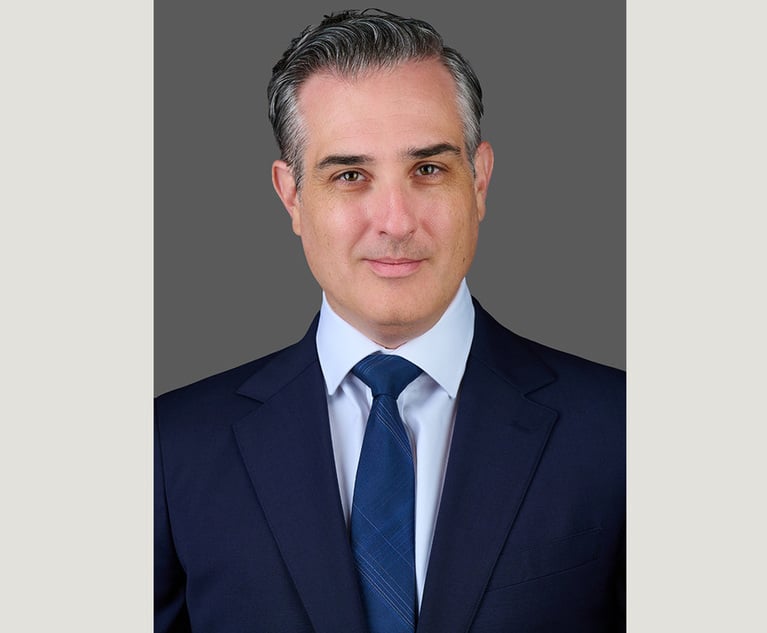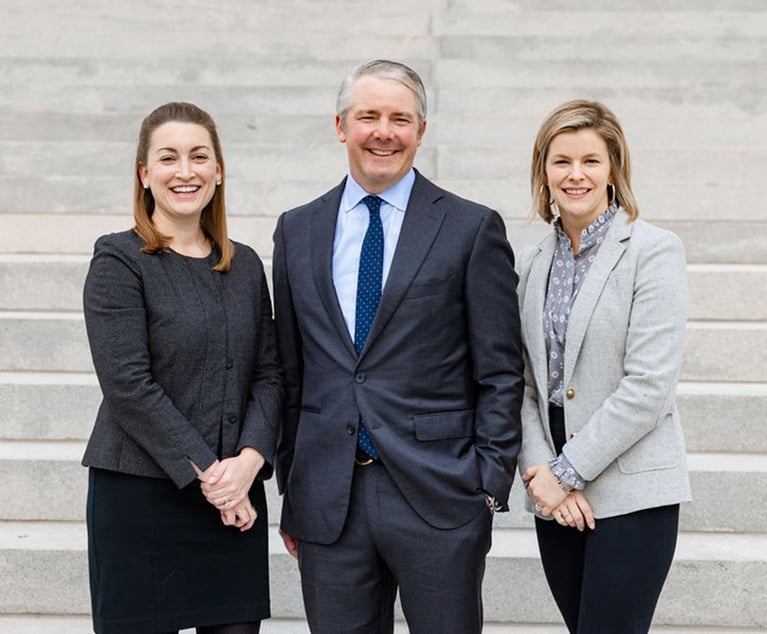Justices Set to Mull Attorney-Client Privilege in Derivative Actions
The Pennsylvania Supreme Court has agreed to hear arguments in a case about the complex attorney-client privilege issues that can arise during derivative actions involving nonprofit corporations and special investigating committees.
November 07, 2017 at 05:49 PM
8 minute read
 Pittsburgh skyline. Photo by ESB Professional/shutterstock
Pittsburgh skyline. Photo by ESB Professional/shutterstock
The Pennsylvania Supreme Court has agreed to hear arguments in a case about the complex attorney-client privilege issues that can arise during derivative actions involving nonprofit corporations and special investigating committees.
The justices issued a three-page per curiam order agreeing to hear arguments on four questions raised in the case Pittsburgh History and Landmarks Foundation v. Ziegler. Two of the questions were posed by the defendants in the case, while the other two were posed by the plaintiffs.
Specifically, the justices agreed to hear arguments on whether the attorney-client privilege standards outlined in the Restatement (Third) of Law Governing Lawyers and the U.S. Court of Appeals for the Fifth Circuit's 1970 ruling in Garner v. Wolfinbarger conflict with state law, and about how the fiduciary duty and common-interest exceptions play into derivative actions involving a special investigative committee.
The appeal arose after an en banc Commonwealth Court panel in April determined that the trial court handling the underlying derivative action issued an improperly broad discovery order. As part of that decision, the Commonwealth Court said the lower court should not have applied the fiduciary duty or common-interest exceptions to the case, but should have looked for potential exceptions to the privilege based on Garner.
According to Commonwealth Court Judge Robert Simpson, the derivative action dates back to conduct that occurred between 2009 and 2013. The plaintiffs were members of the board of trustees of the Pittsburgh History and Landmarks Foundation and the related Landmarks Financial Corp. According to Simpson, questions began arising about the board's management and efforts to reconstitute the board.
Simpson noted that the current board statuses of the plaintiffs are contested, but in October 2013 they formally demanded the nonprofit corporations secure enforcement of their claims on behalf of the companies. The board then appointed a joint investigating committee to determine whether to proceed with the derivative action. The investigative committee, which was composed of sitting members of the board with advice from independent counsel, ultimately determined not to proceed with the derivative action, and the board adopted that recommendation.
Based on the committee's report, the board filed a motion with the lower court to dismiss the derivative action. The plaintiffs, however, also filed a motion to compel all information that had been provided to the investigating committee.
Relying on the state Supreme Court's 1997 decision in Cuker v. Mikalauskas and the American Law Institute Principles of Corporate Governance, the lower court said the defendants needed to provide the requested materials, including all related legal opinions and communications between the board and the investigating committee.
On appeal, the defendants contended that the trial court's decision would effectively eliminate attorney-client privilege in derivative actions and would “dramatically change the role of counsel to any corporation in Pennsylvania,” according to Simpson.
Simpson rejected several arguments raised by the defense, but he also said the court's discovery order was too broad. The court, he said, should have applied Garner, which would have allowed for more limited discovery.
Simpson also noted that the plaintiffs were seeking legal advice about alleged efforts to pack the board, whether some of the board's investments were proper, and whether the board could vote out all existing trustees and elect successors based on a state statute.
“Such legal advice rendered at about the time of those alleged events and before the current suit was pending could be reached by a discovery order, consistent with both Section 7.13 of the ALI Principles and Section 85 of the Restatement (Third) of the Law Governing Lawyers, after consideration of pertinent factors,” he said.
Gary Hunt of Tucker Arensberg, who represents the defendants, did not return a message seeking comment, and Walter DeForest of DeForest Koscelnik Yokitis & Berardinelli declined to comment.
 Pittsburgh skyline. Photo by ESB Professional/shutterstock
Pittsburgh skyline. Photo by ESB Professional/shutterstock
The Pennsylvania Supreme Court has agreed to hear arguments in a case about the complex attorney-client privilege issues that can arise during derivative actions involving nonprofit corporations and special investigating committees.
The justices issued a three-page per curiam order agreeing to hear arguments on four questions raised in the case Pittsburgh History and Landmarks Foundation v. Ziegler. Two of the questions were posed by the defendants in the case, while the other two were posed by the plaintiffs.
Specifically, the justices agreed to hear arguments on whether the attorney-client privilege standards outlined in the Restatement (Third) of Law Governing Lawyers and the U.S. Court of Appeals for the Fifth Circuit's 1970 ruling in Garner v. Wolfinbarger conflict with state law, and about how the fiduciary duty and common-interest exceptions play into derivative actions involving a special investigative committee.
The appeal arose after an en banc Commonwealth Court panel in April determined that the trial court handling the underlying derivative action issued an improperly broad discovery order. As part of that decision, the Commonwealth Court said the lower court should not have applied the fiduciary duty or common-interest exceptions to the case, but should have looked for potential exceptions to the privilege based on Garner.
According to Commonwealth Court Judge Robert Simpson, the derivative action dates back to conduct that occurred between 2009 and 2013. The plaintiffs were members of the board of trustees of the Pittsburgh History and Landmarks Foundation and the related Landmarks Financial Corp. According to Simpson, questions began arising about the board's management and efforts to reconstitute the board.
Simpson noted that the current board statuses of the plaintiffs are contested, but in October 2013 they formally demanded the nonprofit corporations secure enforcement of their claims on behalf of the companies. The board then appointed a joint investigating committee to determine whether to proceed with the derivative action. The investigative committee, which was composed of sitting members of the board with advice from independent counsel, ultimately determined not to proceed with the derivative action, and the board adopted that recommendation.
Based on the committee's report, the board filed a motion with the lower court to dismiss the derivative action. The plaintiffs, however, also filed a motion to compel all information that had been provided to the investigating committee.
Relying on the state Supreme Court's 1997 decision in Cuker v. Mikalauskas and the American Law Institute Principles of Corporate Governance, the lower court said the defendants needed to provide the requested materials, including all related legal opinions and communications between the board and the investigating committee.
On appeal, the defendants contended that the trial court's decision would effectively eliminate attorney-client privilege in derivative actions and would “dramatically change the role of counsel to any corporation in Pennsylvania,” according to Simpson.
Simpson rejected several arguments raised by the defense, but he also said the court's discovery order was too broad. The court, he said, should have applied Garner, which would have allowed for more limited discovery.
Simpson also noted that the plaintiffs were seeking legal advice about alleged efforts to pack the board, whether some of the board's investments were proper, and whether the board could vote out all existing trustees and elect successors based on a state statute.
“Such legal advice rendered at about the time of those alleged events and before the current suit was pending could be reached by a discovery order, consistent with both Section 7.13 of the ALI Principles and Section 85 of the Restatement (Third) of the Law Governing Lawyers, after consideration of pertinent factors,” he said.
Gary Hunt of
This content has been archived. It is available through our partners, LexisNexis® and Bloomberg Law.
To view this content, please continue to their sites.
Not a Lexis Subscriber?
Subscribe Now
Not a Bloomberg Law Subscriber?
Subscribe Now
NOT FOR REPRINT
© 2025 ALM Global, LLC, All Rights Reserved. Request academic re-use from www.copyright.com. All other uses, submit a request to [email protected]. For more information visit Asset & Logo Licensing.
You Might Like
View All

'Taking the Best' of Both Firms, Ballard Spahr and Lane Powell Officially Merge
6 minute read

Trending Stories
- 1Courts, Lawyers Press On With Business as SoCal Wildfires Rage
- 2Florida, a Political Epicenter, Is the Site of Brownstein Hyatt's 13th Office
- 3Law Firms Close Southern California Offices Amid Devastating Wildfires
- 4Lawsuit alleges racial and gender discrimination led to an Air Force contractor's death at California airfield
- 5Holland & Knight Picks Up 8 Private Wealth Lawyers in Los Angeles
Who Got The Work
Michael G. Bongiorno, Andrew Scott Dulberg and Elizabeth E. Driscoll from Wilmer Cutler Pickering Hale and Dorr have stepped in to represent Symbotic Inc., an A.I.-enabled technology platform that focuses on increasing supply chain efficiency, and other defendants in a pending shareholder derivative lawsuit. The case, filed Oct. 2 in Massachusetts District Court by the Brown Law Firm on behalf of Stephen Austen, accuses certain officers and directors of misleading investors in regard to Symbotic's potential for margin growth by failing to disclose that the company was not equipped to timely deploy its systems or manage expenses through project delays. The case, assigned to U.S. District Judge Nathaniel M. Gorton, is 1:24-cv-12522, Austen v. Cohen et al.
Who Got The Work
Edmund Polubinski and Marie Killmond of Davis Polk & Wardwell have entered appearances for data platform software development company MongoDB and other defendants in a pending shareholder derivative lawsuit. The action, filed Oct. 7 in New York Southern District Court by the Brown Law Firm, accuses the company's directors and/or officers of falsely expressing confidence in the company’s restructuring of its sales incentive plan and downplaying the severity of decreases in its upfront commitments. The case is 1:24-cv-07594, Roy v. Ittycheria et al.
Who Got The Work
Amy O. Bruchs and Kurt F. Ellison of Michael Best & Friedrich have entered appearances for Epic Systems Corp. in a pending employment discrimination lawsuit. The suit was filed Sept. 7 in Wisconsin Western District Court by Levine Eisberner LLC and Siri & Glimstad on behalf of a project manager who claims that he was wrongfully terminated after applying for a religious exemption to the defendant's COVID-19 vaccine mandate. The case, assigned to U.S. Magistrate Judge Anita Marie Boor, is 3:24-cv-00630, Secker, Nathan v. Epic Systems Corporation.
Who Got The Work
David X. Sullivan, Thomas J. Finn and Gregory A. Hall from McCarter & English have entered appearances for Sunrun Installation Services in a pending civil rights lawsuit. The complaint was filed Sept. 4 in Connecticut District Court by attorney Robert M. Berke on behalf of former employee George Edward Steins, who was arrested and charged with employing an unregistered home improvement salesperson. The complaint alleges that had Sunrun informed the Connecticut Department of Consumer Protection that the plaintiff's employment had ended in 2017 and that he no longer held Sunrun's home improvement contractor license, he would not have been hit with charges, which were dismissed in May 2024. The case, assigned to U.S. District Judge Jeffrey A. Meyer, is 3:24-cv-01423, Steins v. Sunrun, Inc. et al.
Who Got The Work
Greenberg Traurig shareholder Joshua L. Raskin has entered an appearance for boohoo.com UK Ltd. in a pending patent infringement lawsuit. The suit, filed Sept. 3 in Texas Eastern District Court by Rozier Hardt McDonough on behalf of Alto Dynamics, asserts five patents related to an online shopping platform. The case, assigned to U.S. District Judge Rodney Gilstrap, is 2:24-cv-00719, Alto Dynamics, LLC v. boohoo.com UK Limited.
Featured Firms
Law Offices of Gary Martin Hays & Associates, P.C.
(470) 294-1674
Law Offices of Mark E. Salomone
(857) 444-6468
Smith & Hassler
(713) 739-1250





